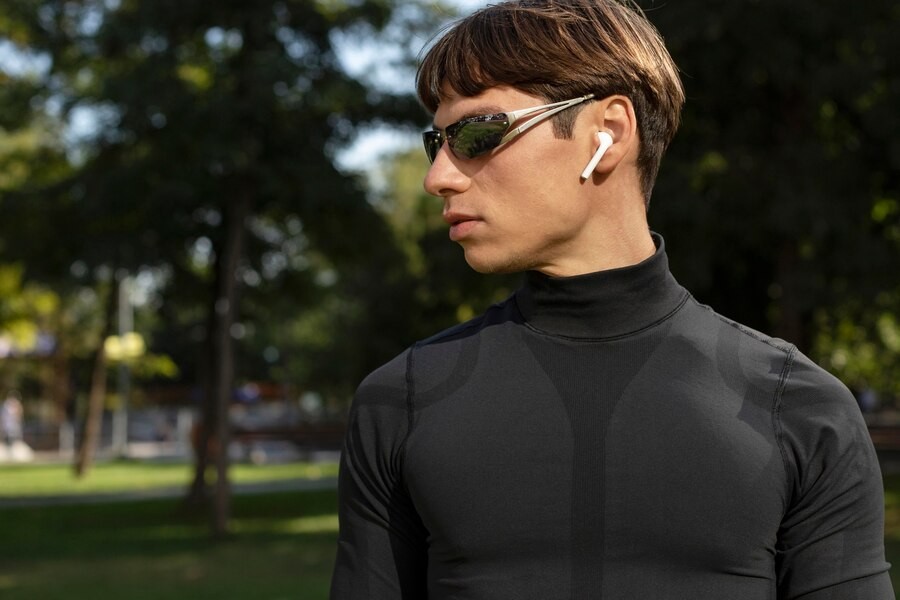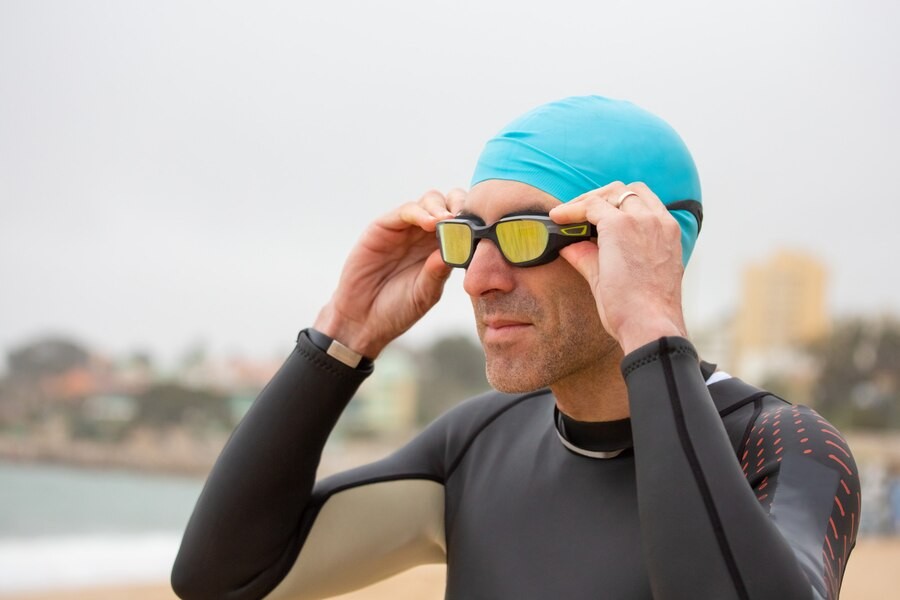Polycarbonate & Trivex Lenses: What is Best For Sports Glasses?

If you are planning to invest in good quality sports or safety glasses, you come across broadly two categories of lenses - Polycarbonate and Trivex. These lenses offer similar protective characteristics like high impact resistance and UV protection. This makes one wonder, which is a better option out of the two?
Based on what attributes you prioritize, your budget, and the activity you participate in, you can choose the most viable option. Let’s save you from the research. We’ve compiled a set of differences between both of these lenses so that you can choose the right lens for your eyewear.
Why are Sports Lenses Different From Standard Plastic Lenses?

Every lens serves a different purpose, based on the kind of activity you participate in. As the name suggests, sports lenses are specifically designed to ensure clear vision while staying impact-resistant during sporting activities. Whereas, CR-39 Plastic lenses focus only on providing optical clarity and improving the visual experience.
When it comes to protection for your eyes from injuries caused by contact sports, you just can’t rely on such standard plastic lenses. One of the benefits of prescription sports glasses is that the material used in these lenses resists high impact while enhancing your vision at the same time.
Sports lenses not only give durability and a high-impact threshold, but also provide sports-friendly characteristics like UV protection, being lightweight, and anti-fog properties. So, don’t let your regular eyeglasses come in the way of your next home run. Choose prescription glasses designed especially for sports.
What are Polycarbonate Lenses?
Unlike the conventional lenses used in regular eyeglasses, sports glasses are designed to only use higher impact lenses for safety. Some people may already have polycarbonate lenses in their regular eyeglasses. This makes one wonder, what are polycarbonate lenses?
Originally designed for astronauts for impact resistance for their windows and helmets, polycarbonate was adapted to eyewear as the demand for higher impact and lighter weight eyeglass lenses increased.
Since these lenses are extensively used and distributed nowadays, you can access a large selection of sports glasses with polycarbonate lenses offering you the eye protection you seek.
What are Trivex Lenses?
Recently, there has been a surge in sports glasses made with Trivex lenses. What exactly are these Trivex lenses and why are they so popular? Originally developed for military fighter jet windshields, Trivex lenses are an upgraded version of polycarbonate lenses, providing similar features like high impact resistance, thin, lighter weight, and protection from UV rays, but with better optical clarity.
These are the lightest lenses available in the market, Lenses are measured for clarity on a scale called ABBE. Trivex has a score of 45 on the ABBE scale. This means they have a very high optical clarity, or less distortion. Trivex lenses are great if you are doing a rimless frame for your prescription sports goggles.
Trivex Vs. Polycarbonate Lenses: Which One is Better

With both of these options used widely by athletes, it can get confusing to understand which is better suited for you. There is no one clear answer to this. Both polycarbonate and Trivex have different benefits. Thus, it all comes down to what feature you are looking for. To make sure that you choose the right pair of lenses, we have given a comparative analysis of both these lenses on various differentiating factors.
Which lens is thicker?
Both these lenses are renowned for their thinness to provide improved optical clarity and to best suit sporting events. However, in making the same prescription in the same frames with both polycarbonate and Trivex lenses, Trivex comes out slightly thicker than polycarbonate, but not enough that anyone would be able to see the thickness difference with the naked eye. It is an average of 0.25mm difference for an average prescription lens.
Thickness usually only matters for cosmetic reasons. People don’t like how it looks to wear “Coke bottle” lenses. But thickness does play a more important role in sports glasses. To meet safety standards for sports, lenses that meet the ASTM standard will need to be thicker to properly meet the safety standard. This is why you may see thicker lenses on safety-rated frames than you would see in your “dress” eyewear. However, safety-rated frames are usually thicker as well to hide some of that lens thickness cosmetically.
Which lens is lighter?
When it comes to boosting your performance in any given sporting activity, the weight of your lens is an essential factor to consider. If you are someone who is struggling with the weight of your sports glasses, then a Trivex lens will be your best option as it is not only lighter than polycarbonate lenses but is the lightest lens material available in the market. Again, the difference is very slight and maybe not noticeable unless one has a very high prescription. When measured in the real world for an average prescription, the difference was only ½ gram (or the weight of a paperclip). That may be enough for people who are sensitive to weight, but may not be enough for most people to notice.
Which lens provides better optical clarity?
With an ABBE score of 45, the Trivex lens provides much better optical clarity than the polycarbonate lens, which has an ABBE score of just 30. The higher the ABBE value, the less chromatic aberration there is in the lens (rainbows on the edges). This is a major factor that makes Trivex lenses a better choice than polycarbonate as optical clarity is especially important to those that have a sensitivity to distortion or light dispersion.
Which lens has better impact resistance?
When it comes to impact resistance, both polycarbonate and trivex lenses are comparable in withstanding impact from a ball or bat. Both materials can pass both ANSI and ASTM safety standards in independent tests. In testing, a projectile or hard ball is shot into the eyewear on a dummy head. If the lens doesn’t break, it passes the test. There have been tests where Trivex has failed, though, in certain frames where polycarbonate almost never fails. Thus, polycarbonate is considered to be the safest material in regard to impact resistance.
However, it has been commonly observed that Trivex lenses are more suited for rimless frames due to their thinner lens. Therefore, if you have a rimless or semi-rimless frame, then Trivex may be a better option for you.
Which lens has a greater tensile strength?
Similarly, tensile strength is just as important as the thickness of a lens. Tensile strength is basically how much of a push or pull your lens can withstand. When it comes to sports, you are going to jostle around a lot, especially in contact sports like football. While your lens and frame must be impact resistant, its tensility will ensure that your eyewear doesn’t give in during extreme pressures.
Theoretically, Trivex lenses are considered to have a greater tensile strength. However, when it comes to real-life situations, it has been noticed that polycarbonate lenses show greater tensility than Trivex lenses. This is important if you are doing drill mounting on regular eyeglasses. Drill mount is not an option for sports, so for sports eyewear, it may not matter.
Which lens has better UV protection?
Both lenses are an excellent choice for UV protection and also for anti-fogging characteristics, however, when both lenses are put under a UV light machine, polycarbonate lenses give a slightly lesser UV protection.
For those who need UV protection not just for active sports but also for specific activities like fishing, check out our detailed guide on choosing the best polarized sunglasses for fishing, which offers additional insights into protecting your eyes under various lighting conditions on the water.
Both lens materials protect the most damaging part of the UV spectrum which is the biggest concern for most people, so this may just be a technicality. But if you want to be completely ensured with UV protection, then Trivex lenses are your go-to type.
Which lens is widely available?
Polycarbonate is the most used and widely available lens used in safety or sports eyewear. Polycarbonate has been around a lot longer than Trivex, and due to its popularity, it is more widely made and available. Trivex is a newer material, and not as popular at this point, which does make manufacturers less willing to make Trivex in more options.
Which lens is more costly?
Because Trivex is a newer material, has a lower production rate, and is optically superior to polycarbonate, they are comparatively more costly than polycarbonate lenses, Trivex lenses are premium lenses, and thus come with a more premium price point. However, the cost difference between them is somewhere around 40% so, it isn’t really that big of an investment.
Conclusion
Both Trivex and polycarbonate lenses are excellent picks for your next purchase of safety or sports eyewear due to their high-impact resistance and long-lasting durability to provide improved optical clarity and protect you from UV rays and fogging particles. There isn’t a particular winner between the two lenses. You can choose a viable option for yourself based on what feature you are looking for.
We at Sporteyes are committed to providing you with the best quality sports glasses, whether Trivex or polycarbonate, we have a wide range of options available for both these lenses. So what are you waiting for? Choose your sports lens today and make your sporting experience the most satisfying!
20 May 2024
Categories: Uncategorized